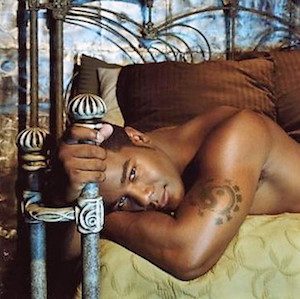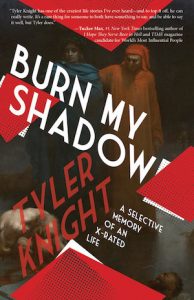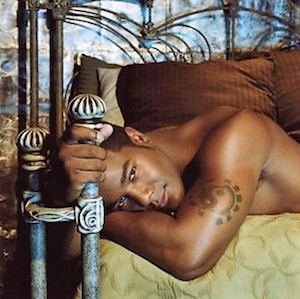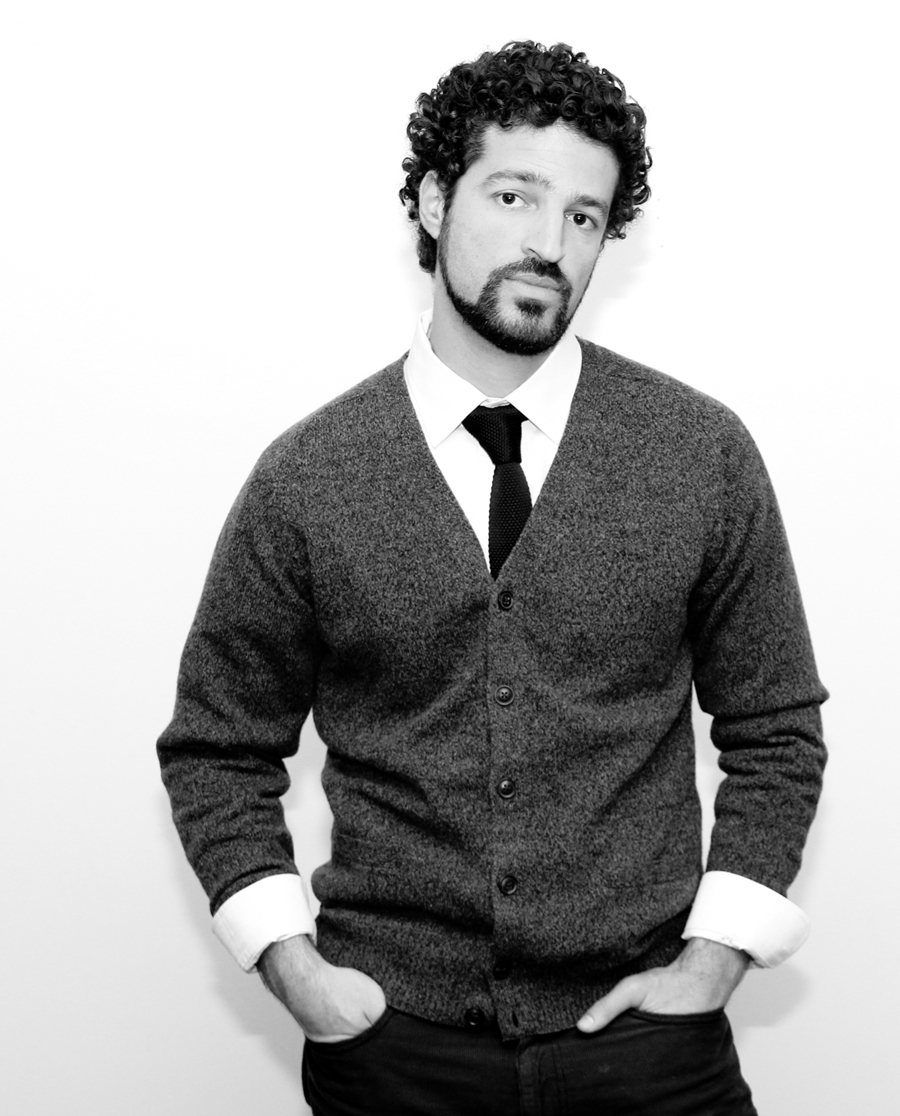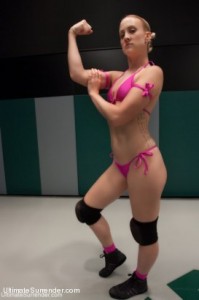I first met Madison Young when we performed together on the same bill at the Center for Sex and Culture in San Francisco. I was immediately struck by the wonderful mass of contradictions. Smart but humble. Cute but fierce. Physical but articulate. Frankly, everything you’d want in a porn star. I’ve been following her career ever since. I was so happy when she took her revolutionary ideas of sexuality and began directing, creating filmed sex that’s the next step in the evolution of erotic filmmaking. She has a new memoir out called Daddy. So I thought I’d sit down and pick her brain about sex, movies, writing, and yes, Daddy.
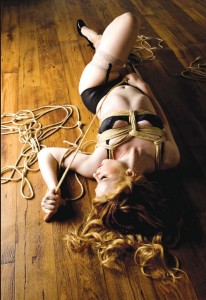
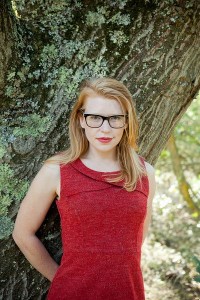 David Henry Sterry: What made you decide to become a professional pornographer? Were you worried about how your family, and the world might judge you?
David Henry Sterry: What made you decide to become a professional pornographer? Were you worried about how your family, and the world might judge you?
Madison Young: I first entered into the world of erotic filmmaking as a performer and model in 2002 and then started directing films in 2005. As an artist and activist, the highly political medium of documenting sexual desire on film in an authentic way that captured and portrayed the way that I experienced my own sexuality, was a huge incentive for me to explore and participate in the world of pornography.
I also needed a reliable steady income to support my life as an artist as well as supplement my non-profit arts organization, Femina Potens. Working with in erotic film allowed me the freedom to pursue my work as a performance artist, give back to the community through the curation of hundreds of queer, feminist, edgy visual and performance art events and express my sexual self in a performative and film making capacity. Simultaneously I was making a political statement and creating change with in the adult film world by focusing on the advocating of authentic expression of self with an emphasis on pleasure and connection.
It’s amazing how powerful the documentation of authentic self can be. It has the ability to create space for others to recognize unexamined parts of their own psyche, their own self, their own desire. It grants them permission to explore uncharted parts of themselves. It grants courage for others to embrace and celebrate who they are. I try to embrace those qualities through out all the work that I do.
I wasn’t especially worried about how the world or my family would judge me, but I realized there would be judgments. One of my mottos is “Reveal All Fear Nothing” I knew if my work and my life were going to be about living life out loud, in the open, and encouraging people to express and celebrate who they are – then I would need to first learn how to do that myself.
If I was going to celebrate and create space for the authentic expression of self I wasn’t going to do so behind closeted doors. I first really examined the work I was doing, why I was doing it, and the social importance of the work I was doing with in the industry. I had to gain a certain understanding of myself before I could communicate the intricacies of my complicated and frequently misrepresented and misunderstood work.
After well over a decade working with in the realm of sexuality and dozens of open conversations, my family is supportive and understanding of the work I do. They understand that I’m an artist and educator and that I work with in the realm of sexuality and pornography. They weren’t always super supportive. They had concerns around safety and I understand that. I started introducing my mother to co-workers and producers of the erotic events and sex toy shops that I was teaching at. Companies like Good Vibrations. Those visits gave my mother a better understanding of how both myself and my work were being presented and the part of the world of sexuality that I was working with in.
When my work started to gain notice with in the university and academic circuit it set my mother and father at ease. I think they thought , “If Yale supports the work that my daughter is doing and is presenting her work well it must not be that bad”.
Largely the greatest judgements I have received are from anonymous folks commenting online when I’m interviewed. These tend to be people who are largely unfamiliar with my work and have heavily judgmental opinions about sex and sex work. It’s understandable and comes with the territory.
Our society heavily shames our sexual desire and simultaneously attempts to capitalize on our sexual fears and anxieties, encouraging body negativity. My work directly works to obliterate the sexual shame that is so inherent in our society by documenting the expression of authentic sexual expression, intimacy, love of our selves and others.
DHS: What made you decide to become a professional memoirist? Were you worried about how your family, and the world might judge you?
MY: Writing was maybe one of the first places that my thoughts and feelings had a place to go and be fully authentic in their expression of self. I remember my first journal as a seven year old child. I would fill the journals up with my most intimate thoughts and feelings, feelings that I didn’t feel safe expressing anywhere else. I remember writing my first queer experiences of self down in my journal. Writing and creation of art and performance have always been a safe container for the exploration, processing, challenging and discovery of self, for me.
I had been working on different variations of “Daddy” for a few years. In the summer of 2012, I met with my publisher Tyson Cornell at Rare Bird. I had handed him the memoir I had been working on and then we had this really great conversation about the book. Through that conversation I discovered the much more challenging and compelling story that needed to be told — a story of a girl finding a place of belonging, needing to believe in something outside of herself, and then watching as everything she thought she knew and that she thought she believed in started to crumble before her eyes. That is when we discover our real strength, our power, our courage, our inner hero, our inner “Daddy.”
Of course that was the most difficult story to tell. The imperfect story. The story that was still very tender and raw and difficult to express. I was most definitely worried that the world would judge me. It was a very vulnerable work. Parts of my life that I hadn’t really discussed publicly before. Parts of my life that weren’t accompanied by well articulated sound bites. And at the same time, I knew that was where the real art existed, where the compelling story was. It’s terrifying to embrace your humanness. But at the same time liberating. I keep going back to my own words of “Reveal all Fear Nothing”.
DHS: You are also an activist, how does that play into your role as an artist?
MY: I feel like they are essentially the same – artist and activist. All artists are essentially activists. We catalyst societal and personal change through the creation of visual and performative work. Art pushes and inspires. Art changes ourselves and the world. It creates space to question everything that we think we know.
DHS: How did you learn to be a filmmaker? How did you learn to be a writer?
MY: I learned how to write by writing and how to make films by picking up a camera and making films. I haven’t been formally trained in any of the arts that I practice. I studied theater at performing art school and then went on to college as a theater major. I think my experience in theater has helped me to be a better filmmaker and writer.
One of the most significant lessons that I remember learning in theater class was when I asked the teacher, “How do you act?” and my teacher said “You just do it. You just are. You allow yourself to be”
I think that knowledge has given me courage to tackle any medium that has drawn me in as an artist. I articulate and dream and visualize the manifesting of my film or a chapter in my book and I try not to let my cerebral bits get in the way.
If I have a film narrative that has been calling to me I lie down and close my eyes and focus in on the character in my visualization. I allow my character to move and dance and fuck and evolve. I follow them on their adventure, learn who they are and try to retain a mindfulness of the cinematic shots in which I’m viewing the actions as they are appearing in my mind.
I do the same with my writing. For the memoir- I would envision the scene in which I would be writing about. I’d view it like a film and listen but this time I allow a voice over narration in my head to slip in and tell the story.
As a kid I spent a lot of time in my head slipping away into those stories. It was a way that I escaped dealing with bullies and being social with my classmates who all seemed to despise me for being different. Overall escaping into the worlds in my head allowed me a great power to visualize and manifest the worlds that I was dreaming up. It prepared me for being an artist.
DHS: I found when I was in the sex business that the lines tended to blur sometimes in a way that was not entirely comfortable. Does having sex professionally affect how you have sex personally?
MY: I don’t think that it does. It’s sometimes easier having sex professionally as there is this specific negotiated container for sex and passion and sexual exploration and to exist in. There is a charge and energy on set that is supportive of you exploring your edges.
In my personal life there are greater negotiations of space for sexual expression, sometimes our sex is closer, smaller, more intimate – largely because of energy levels of working all day and parenting all day and attempting to not wake up our sleeping toddler.
I prefer larger energy exchanges (although intimacy can be nice). We do get out of the house and create space for some of our larger than life kinky and sexual fantasies to fly high though. Mostly that happens at dungeon spaces or hotels or rental cars. I really want to try out the San Francisco Hook Up Truck. I’m hoping to try that this weekend with Daddy for his birthday.
DHS: Do people make assumptions about you because you make movies that have explicit sex in them?
MY: I’m sure they do but I don’t usually get to hear what those assumptions are. I’m very open with the people I meet about my work. I’m very grateful to live in the bay area where I feel there is greater acceptance of sex work than in many areas of the country. I feel like I’m also very accessible. When folks have questions or want to talk about the politics and inner workings of pornography and it’s social and culture impact/significance – I’m nearly always open and available to delve into that conversation. Those conversations to debunk negative and harmful stereo-types that are propagated through the media.
DHS: What kind of pornography turns you on? What kind of pornography turns you off?
MY: I love beautiful porn. Erotic films that capture the beauty of the body, the beauty of sexual desire. The erotic films and porn I enjoy often have an artistic edge to them. I love a lot of the old Vivid Alt films by Eon McKai, Dana Dearmond and Kimberly Kane. I tend to like films with heavy kink elements to them, queer sex, connected, hot sweaty, expressions of lust and desire.
Its a huge turn off if I’m watching a porn and I feel like the performers are not actually having an incredible time or are absent or disconnected – that’s just a huge turn off.
The porn that I shoot and direct is a big turn on for me. It’s like looking through a photo album of pleasure induced moments with on and off screen partners. All these years I’ve been documenting my own sexual evolution, and that really turns me on.
DHS: The word feminist has become so loaded in our culture? How do you define it in your life and in your work?
MY: Feminism with in the context of my life focuses on empowerment and choice. Choice of gender expression, choice to love, choice to express and articulate my sexual desires. Feminism informs my submission, my politics, my work, my writing, my film making, the way I make art, the way I parent. It involves a degree of consciousness of the intersections of systematic oppression, how to operate with in or outside of those systems, self awareness of how our individual actions contribute to larger existing power struggles.
Feminism with in my parenting looks like empowering my child with knowledge of self – asking my child what their preferred gender expression or preferred name is rather than assuming roles based on the sex they were assigned at birth. I empower my child with knowledge about their body – names for their body parts: vulva, anus, uterus. My child knows how to negotiate space for themselves, how to ask for consent to hug or kiss another person and knows that others must ask for their consent to gift affection toward them. Teaching agency over one’s body is a key factor in how feminism plays into my parenting.
I also emphasize through a mantra with my toddler ” Be gentle to yourself, Be gentle to others, Be Gentle to the world around you.” Very simple yet very radical.
Many of these same simple feminist concepts I carry with me into my own work. Both expressing consent and agency over my own body and facilitating space for others to communicate the type of affection they wish to exchange with one another, facilitating that negotiation and then documenting it. Facilitating space and celebration of gender expression. Advocating for my own self care on set, advocating for other’s self care. Being gentle with myself, with others and with the world around me.
We don’t talk about things in our house using words like good and bad. I’m trying to do away with this binary way of thinking. Life is much more complex than that. We talk about how anyone is capable of being gentle or not gentle. A police officer might have a job of being gentle but I’ve seen some cops being down right not gentle at protests for nothing more than occupying space in this world. The radical gentle. Radical love. Love. Loving gentle actions. So simple yet so radical.
DHS: Was it difficult taking the seemingly random events of life and crafting a random out of them into a book? Was it difficult revealing yourself on the page?
MY: Yes it was definitely a challenge. I had to simultaneously create enough space from my life to view myself as a character in a narrative and craft a very specific story from very specific scenes in my life while delving into really personal emotionally intimate and challenging moments. It was a challenge and I’m so happy that I had such a great team at Rare Bird that I was working with to really focus the story. There are so many very significant people and elements of my life that just didn’t make it into the book because it wasn’t absolutely essential in the telling of this story. I try to frame the story by letting the reader know they are only reading one slice of my life. This memoir could have been told a dozen different ways. Maybe some of those stories will come to fruition in future books. It was really hard editing and approving edits for the memoir though. Seeing people or parts of your life not make it to the final cut, that was hard. There’s just such an emotional investment there. But then I’d take a step back from it and see the art that we were sculpting, the essential elements of the story, carving out everything that isn’t that story. Regarding revealing myself, some chapters were definitely more difficult than others. I wanted to just revel in the chapters that were filled with love and lust. The chapters dealing with topics like sobriety, depression and infidelity – those were difficult chapters. But it felt really healthy and cathartic making my way through the tough stuff.
DHS: What advice do you have for beginning writers? Beginning adult filmmakers?
MY: For beginning adult filmmakers I’m facilitating the first ever 3 day- 30 hour Erotic Film School(www.EroticFilmSchool.com) in which students will have the opportunity to create a film in a collaborative, hands on experience working with industry professionals as we tackle everything from pre production: shot lists and model negotiations to post production: editing and submitting films for erotic film festivals. For anyone interested in erotic film making I highly recommend applying at www.EroticFilmSchool.com . Also I’m currently working on my next book, the DIY Porn Handbook:Documenting Our Own Sexual Revolution.
For film makers and writers I encourage really developing a practice. Don’t wait for some magical time or degree to pick up a pen or a camera. Borrow a camera, shoot on your iPhone, start viewing the world through a lens and see what you see. What do you gravitate toward? Where do you find beauty? Get to know yourself as an artist through your practice. Volunteer or intern for a working artist, filmmaker or writer. Study them and the way that they work. I’m always staffing volunteers and interns to assist me with my projects at http://IAmTeamMadison.wordpress.com . Be fearless in your pursuit of your passion, your truth.
Madison Young is a sex positive Tasmanian devil. This sexpert grew up in the suburban landscape of Southern Ohio before moving to San Francisco, California in 2000. Since then this mid-western gal has dedicated her days to facilitating safe space to dialogue on the topic of fringe identities and cultures as well as documenting healthy expression of sexuality. Young’s breadth of work in the realm of sexuality spans from documenting our sexual culture in her feminist erotic films to serving as the Artistic Director of the forward thinking non-profit arts organization, Femina Potens Art Gallery. She can be found on Twitter @madisonyoung.
David Henry Sterry is the author of 16 books, including Johns, Marks, Tricks and Chicken Hawks: Professionals and Clients Writing about Each Other and Hos, Hookers, Call Girls and Rent Boys: Professionals Writing on Life, Love, Money and Sex, which was featured on the cover of the New York Times Book Review. His new book is Chicken: Self-Portrait of a Young Man for Rent (10-Year Anniversary Edition). He can be found on Twitter @sterryhead.
